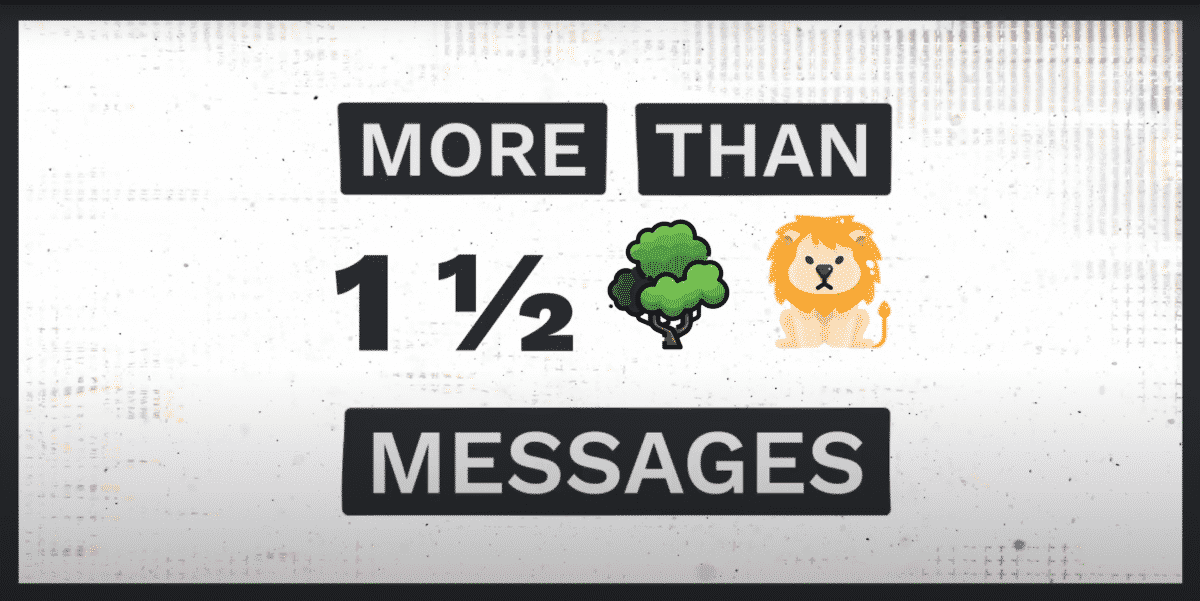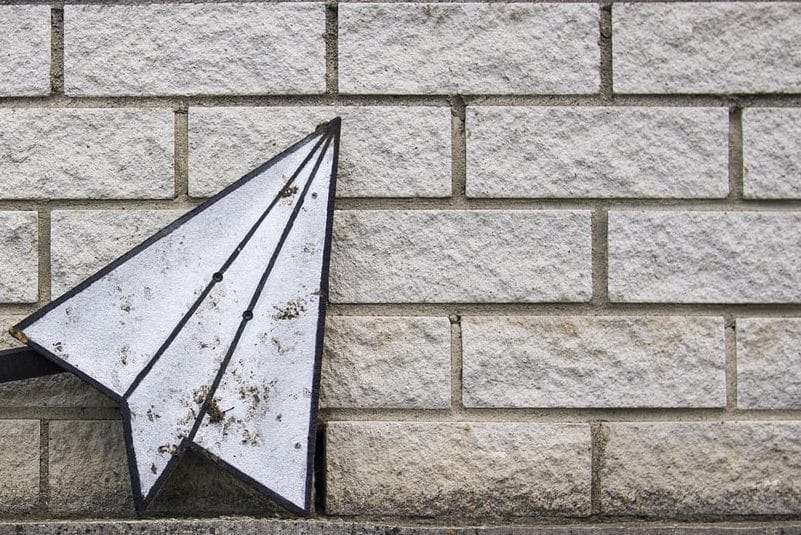Online communication.
How fast you should answer your email? How often should you check it?
The beautiful thing about the Internet is how much it has enabled us all to communicate. We’re talking less and less but we’re communicating at levels unprecedented in human history.
We first crossed the oceans with phone calls less than 100 years ago. Now, we’re using satellites in space to send near-instantaneous signals to the other side of the globe.
It’s not a stretch to say that we haven’t evolved to handle the sheer volume of communication we’re faced with daily.
But how much is that, you wonder?
Over 1,500,000,000,000 messages are sent daily. That’s one and a half trillion messages.

So, this article focuses on how you can handle the massive amount of communication coming your way over email. To do so we will take a look at:
- The hidden cost of checking email too often (attention residue).
- The best technique to deal with email. Hint: it’s an email schedule.
- How to build a godlike email schedule.
Let’s get to it!
How to deal with Email
Email is the lifeblood of business. Unfortunately.
Unfortunately not because email is bad per se, but because so many people are misusing email.
When I was a kid I got a beta invite for Gmail from a friend — let’s call him Mitio. This was so exciting — I could write anyone in the world (not really, email wasn’t that popular) and I could talk to them almost immediately.
So, I started sending messages to everyone. I watched a video — I sent an email to the creator. I played a game — I sent a message to the game developer. I saw a movie — I emailed the movie stars (now I realize the emails I’ve found on google were probably fake).
So, what did that look like?
First, I sent the message. Then, I waited for a couple of days or even a week or two. Finally I, sometimes, received an answer.
And… that was normal. Mitio was also waiting for quite a bit for his emails. Everyone was. Email just wasn’t that “fast”. It was a “when I have some time I’ll answer” thing.
Now, imagine waiting for a week before you answer an email from your boss because you “didn’t have time for it”.
Might not be the best idea!
CONTINUE LEARNING FROM YOUR EMAIL
Building the best possible life for yourself is hard. We get it.
Our newsletter won’t magically make it easy but it will help. See you there!
The reality of Email

In most companies, people should answer email in one business day. You have 6 to 8 hours to read the email, think of an answer, and send it back. All that while, you know, working on your main tasks.
That’s something we all could deal with little trouble. The problem is that what should happen and what does happen are two completely different things.
In reality, most people respond to email in 1 to 2 hours.
Yes, 1 to two hours. You read that correctly.
I imagine this number doesn’t sound as frightening to you as it does to me. But it should. Let me explain why.
Why answering messages too often is a massive problem
Two words: Attention Residue.
What that means is when you focus on one thing and then move your attention to something else — you need a bit of time to adjust. Maybe 5 minutes, maybe 10, or even 15.
During that period, you aren’t giving your full attention to the task at hand. You’re not performing at 100%. As much as 40% of your efficiency can go out of the window while you’re not paying your full attention to the task at hand.
That’s a lot of efficiency out of the window.
That’s 13.3-hour workdays instead of 8-hour workdays.
For the same work!
So, how do you avoid it?
You don’t context switch. Or at least you do it as little as possible. Depending on your job and role this means different things, but less is more here.
If you want to read more on that — check out the original paper on the topic.
How often should you answer your emails?
So, answering email less often is an easy thing to say but a hard thing to do. Here’s how to approach that:
💡 Check your emails on a schedule. That’s the best productivity tip there is to email.
Tweet
It’s a simple approach:
- You block one or several slots in your calendar.
- You read and write emails in those slots only.
- Profit?
There are 3 problems with that:
- How to pick the frequency and duration of said time slots?
- How to convince your colleagues and boss that this is a good idea?
- How to stick to your schedule?
Let’s go over those one by one:
How to pick the frequency and duration of your email schedule?
There are 4 factors you care about when deciding your email slots. We’ll go over them one by one and in the end you’ll have the tools to figure out what works best for you. If that’s not what you’re looking for, I’ll also provide a quick starting point at the end of the list so you can start right now.
- Urgency. Let’s start with the outlier. No matter what you do, some people will use email for urgent matters. Fixed slots and urgent messages don’t mix too well, so we will have to cheat a bit. First, set up an email filter (check the video for a visual reference on how). Next, add all the people likely to email you with urgent news, updates, or actions to it and make sure you get notified for those. Yes, that immediately breaks the concept of email slots, but it’s better than living in stress. Also, you can: Teach people how to use email. Email is not for urgent matters. It is an asynchronous medium and it should be used as one. Ask people to use the phone, IM of choice, or texts for urgent matters. Take your time, be patient, and ask repeatedly — it will take a while for people to change their habits.
- Role — depending on your role, you might need a lot more or a lot fewer slots in your calendar. If you’re in engineering, design, or art — you might be able to check your email once or twice per day. If you are responsible for more than your own work — you will need several slots spread across your day. Finally, if you’re in sales or running a larger scale part of an institution — you might want to forget about email checking slots altogether and use “focus time”. Basically, time not to check email.
- Company Culture — the speed you’re expected to answer is dictated by the culture of your company. Understand that and you will know the implicit expectations people have towards you. Find what those are and you will be able to slowly and steadily change them.
- Your Communication — the better you are at communicating your schedule and the better you are at selling the idea to your colleagues, the more they will respect it. So brace yourself, take your time and start convincing your colleagues that that is the best way to go about your productivity (because it is!)
If all that is too much for right now, just block 3 slots of 10 minutes every day. That should do the trick for the time being.
Also, don’t forget to adjust the duration as you progress with your email-checking habit.
How to convince your colleagues and boss that this is a good idea?
The secret is… patience and consistency.

Most people expect to say something once and everyone to instantly remember and follow it for the rest of their lives. Unfortunately, that doesn’t work.
People are busy — they have their own lives, agendas, and thoughts. They don’t care about you as much as they do about themselves. And that’s okay.
So, how do you get those people who’re distracted from the awesome-est person in the universe (you), for no good reason I might add, to pay attention?
I’m glad you asked!
Here’s a simple approach:
- Find the easiest way for people to deal with their emails towards you. They might talk to you every morning for 3 minutes to get rid of most emails. Or maybe send you a text when something is urgent. Or, make their own time-slots even? Find something simple and easy so it’s not a massive effort for your colleagues to adapt.
- Now, propose and negotiate that approach with every one of the key people that you email with the most. You might have to change the proposed approach to fit the individual better, but as long as it is able to fit both your and the other person’s needs, it should be okay.
- Finally, gently remind them if they happen to break your agreement (yes, they will). Rinse and repeat until the new behavior is the norm.
Now, to the harder part — how to deal with your own self.
How to stick to your schedule?
Sticking to your own schedule usually sounds easier than it actually is. Doing something once is typically easy but doing it day in and day out can be quite hard.
So, how do you stick to your schedule?
To answer that question, let’s analyze the reasons you might not stick to it:
- Notifications. You know my attitude towards notifications. Turn them all off. Keep on the notifications only from your email filter.
- Human distractions — “Hey can you chat for a moment?”. It depends here — if it’s part of your role to help and your task at hand isn’t urgent — go help out. Otherwise, explain that you’re currently focused on work and ask the person to talk to you later (or even set up an appointment using the scheduling assistant for both of you to focus #protip).
- “You” distractions — opening your email by habit. Or because you’re bored for a moment. This is one of those things that “feel” productive but isn’t. You’re not getting more work done — you’re low-key multitasking and spreading your attention everywhere. Be mindful of those moments and try to embrace the boredom. It’s good for your creativity — trust me on this one!
- Peer pressure — everyone else is doing it (it being checking their email). The more you talk to your colleagues and discuss your approach, the easier it will be to keep it up.
I can’t possibly go over all the potential ways for you to get distracted, so I’ll cut it here. If you still have trouble — feel free to pop me a message in the community on Discord. I’ll help out!

Fin
Dealing with online communication is hard. I have yet to write full articles on work messages and personal messages. The thought of it is even kind of scary (and that’s not the actual messages ^^).
But, being mindful about your email habits and working towards improving them is the only way for you to be able to work at 100% (or even more).
Anyway, thanks for reading, and stay awesome!
— Jordan










